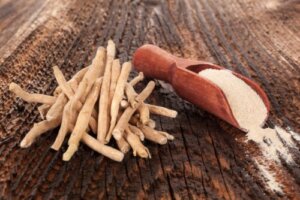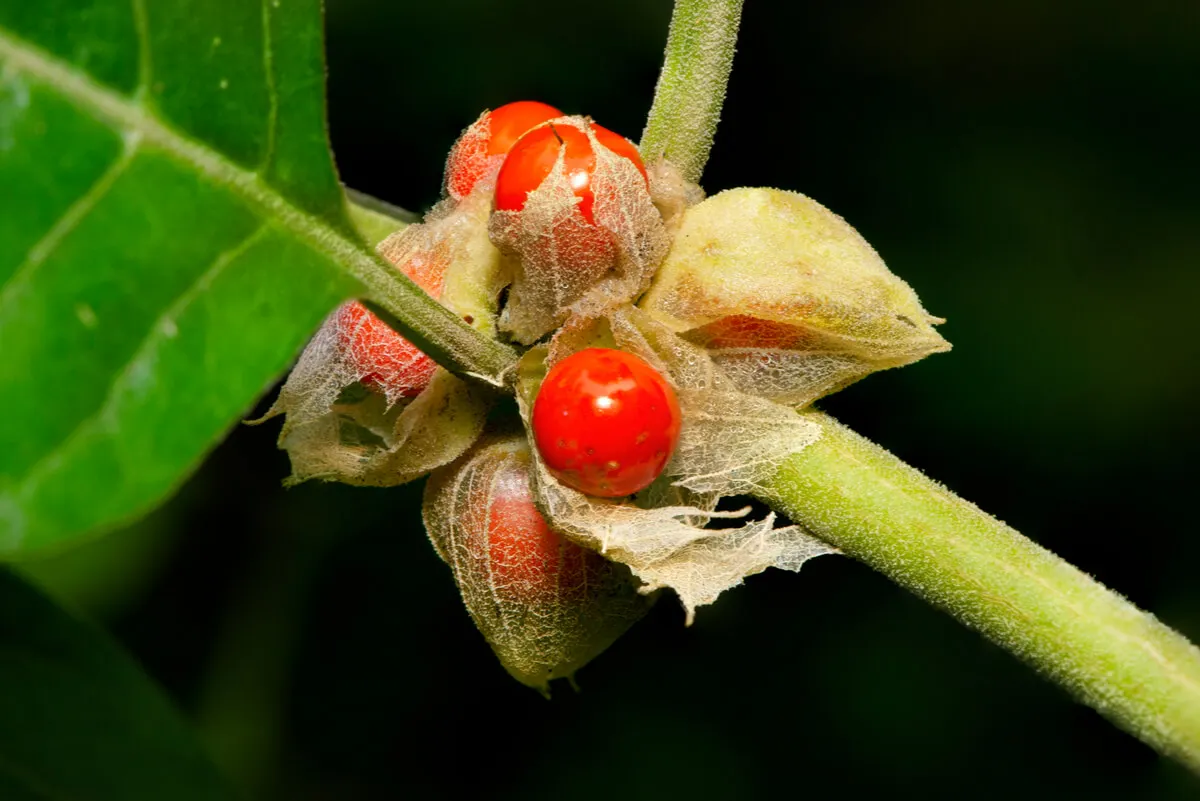The Benefits and Contraindications of Ashwagandha


Reviewed and approved by the doctor Leonardo Biolatto
Ashwagandha (Withania somnifera L.) is also known as “oroval” and “bufera somnifera” (in Catalan). It’s a very popular herb in Indian Ayurvedic medicine, valued for its adaptogenic and revitalizing properties.
According to a study published in the medical journal Cureus, Ashwagandha extracts have positive effects in relieving stress and anxiety. In addition to this, various health benefits are attributed to it. Let’s take a closer look.
What is Ashwagandha?
Ashwagandha is called by a variety of names in different territories and cultures. Some are phonetically similar, such as Ajagandha, Asgandha, or Ashvagandha. However, it’s also known as Ayurvedic Ginseng or Indian Ginseng, even Cerise d’Hiver and Winter Cherry (winter cherry, in French and English, respectively).
This is a plant that belongs to the Solanaceae family, which also includes tomatoes, tobacco, and potatoes. Ashwagandha grows between 60 and 120 centimeters tall, with semi-woody stems, oblong-ovate leaves, and greenish-yellow bell-shaped flowers.
Its fruit is spherical, small, and bright red (hence some of its many names). However, various parts of this species are used, including the leaves, as well as extracts or a powder made from the root, which are the most commonly marketed forms.
Ashwagandha cultivars are usually found in India and Pakistan; however, both supplements and leaves of the plant are now distributed in many other countries.
Properties of ashwagandha
Ashwagandha is noted for its content of biologically active chemical compounds, including alkaloids, steroidal lactones, and soponins.
Other substances contained in this plant include the following:
- Triethylene glycol: in clinical studies with mice this substance has shown interesting effects against insomnia.
- Flavonoids: these are known for their ability to inhibit the effects of oxidative stress.
- Mineral salts such as iron and potassium.
We think you may be interested in reading this, too: 10 Negative Effects of Stress on Your Health To Keep in Mind
Ashwagandha health benefits
There are several health benefits of ashwagandha; many are scientifically proven. In this sense, anti-inflammatory, sedative, antioxidant, anti-diabetic, and revitalizing properties are attributed to it. Let’s take a closer look.
1. It can help reduce the effects of stress in the body

Ashwagandha has been classified as an adaptogenic remedy, that is, it has the ability to increase the body’s resistance to situations of physical and mental stress. Research published in the Indian Journal of Psychological Medicine found that ashwagandha supplements help reduce cortisol levels.
2. It can help control anxiety
Because of the above, researchers consider it a good supplement against episodes of stress and anxiety. In particular, it’s attributed to a relaxing effect, since it regulates the chemical signaling of the nervous system that causes the feeling of tension.
3. Ashwagandha decreases the symptomatology of depression
Depression is a mental health problem that requires the intervention of professionals. Therefore, herbal supplements should not be considered a first-choice treatment to control its symptoms. Even so, some plants have shown a potential to improve mood in the face of this condition.
In a controlled study reported in the Indian Journal of Psychological Medicine, 64 adults were given 600 milligrams of a highly concentrated ashwagandha extract each day. After 60 days, 79% reported a reduction in symptoms of major depression. Despite this, more evidence is needed.
4. Ashwagandha contributes to regulating glucose levels
Although it’s not considered a remedy to fight diabetes, some research has determined that ashwagandha has the ability to regulate blood glucose levels.
In this regard, in a test tube study, published in the journal Phytochemistry, it was observed that it increased insulin secretion and improved sensitivity to this hormone in muscle cells.
On the other hand, in a clinical trial reported in the Indian Journal of Experimental Biology, it was determined that extracts of this medicinal herb favor the regulation of sugar levels in both healthy people and people with diabetes.
5. It promotes muscle mass increase
Sports and fitness enthusiasts can find in ashwagandha a natural supplement to increase muscle mass. In fact, as a randomized controlled trial in the Journal of the International Society of Sports Nutrition found, ashwagandha improves body composition and increases muscle strength.
6. It may help help reduce body fat
It even appears to help reduce body fat percentage. Of course, for this to happen, it must be included in the framework of a healthy diet and good habits, such as physical exercise.
7. It helps fight inflammation
A large number of diseases are attributed to an uncontrolled inflammation markers. On this, animal studies suggest that ashwagandha has anti-inflammatory properties that help keep the body healthy.
8. It can reduce your risk of heart disease
In human studies, the components of the plant increased the activity of immune cells that fight infections and are also key to regulating inflammatory processes. It has even been observed to decrease C-reactive protein (CRP), a marker associated with an increased risk of heart disease.
9. It lowers cholesterol and triglycerides
According to anecdotal data, another reason Withania somnifera L may be a supplement to reduce the risk of cardiovascular disease is that it helps control cholesterol and triglyceride levels in the blood.
Research in rats found that ashwagandha helped reduce total cholesterol and triglycerides by 53% and almost 45%, respectively. A decrease in LDL or bad cholesterol levels has also been observed. As in the previous cases, more evidence is needed.
Like this article? You may also like to read: General Adaption Syndrome: How We React to Stress
10. It has antioxidant activity
The antioxidant activity of ashwagandha helps protect nerve cells against the negative effects of free radicals. In research published in Neurochemical Research, rats with epilepsy that were treated with this plant showed a decrease in the deterioration of spatial memory.
11. Ashwagandha contributes to improved brain function
In the same vein, in a study in Pharmacognosy Research, a group of healthy men took 500 milligrams of standardized ashwagandha extract daily. In the end, they reported significant improvements in their performance and reaction time compared to those who received a placebo.
12. It can help with sleep disorders
Because of its withanolides and triethylene glycol content , it’s suggested that the plant helps to reduce sleep disorders. In particular, it reduces the recurrence of insomnia.
13. It can help with the treatment of anemia
In Ayurvedic medicine, ashwagandha is used to reduce states of nervous fatigue, weakness, and iron deficiency anemia. Apparently, its extracts help to increase hemoglobin and erythrocyte levels.
14. It increases physical performance
Studies have shown that ashwagandha can help increase respiratory capacity and muscle strength during intense physical activity.
15. Ashwagandha raises energy levels
In the same vein as the previous point, ashwagandha is considered to be revitalizing, not only for athletes, but also for the elderly, helping to combat low mood and vitality.
16. It can help with rheumatic conditions
Due to its anti-inflammatory properties, it’s used as a supplement against rheumatic conditions, reducing deterioration in tendons, ligaments, joints, and bones. Although this is still under investigation.
17. It’s aphrodisiac
In India, its supplements have been traditionally used to improve sexual response, which could positively affect fertility, although there is no conclusive evidence.
18. It can aid in thyroid hormone production
Trials have been done that allow affirming that the treatment with Withania somnifera can be beneficial to normalize the thyroid indexes in patients with subclinical hypothyroidism..
19. It’s associated with increased immunity
It’s attributed to the ashwagandha an effect on the increase of leukocytes, which would strengthen the immune system, helping to prevent possible infections.
20. Decrease in bone loss
In vitro studies have found that consumption of Withania somnifera has been found in in vitro studies to slow bone loss, which, when applied to humans, would be good news for those suffering from osteoporosis.
21. It may be promising for the treatment of cancer
The use of withanolide extracts (withaferin A) seems promising for the treatment of certain types of cancer by inhibiting the growth of tumor cells. However, the findings are not yet conclusive.
Contraindications of ashwagandha
All herbal remedies derived from ashwagandha should be used with caution. As with other plants, there are risks of side effects and possible interactions. In this case, its alkaloid content makes it incompatible with some patients and their medical treatments.
In general, Ashwagandha is contraindicated in the following cases:
- Pregnancy and lactation
- Children under 12 years of age
- Hyperthyroidism
- Hemochromatosis
- Gastric sensitivity
- Treatments with antidepressants such as zolpidem, clonazepam, sertraline, and others
- If you take sleeping pills
- Medications for hypertension or high cholesterol: here, it’s advisable to consult a doctor before taking it

Dosage and presentations
To date, there is no data on the exact recommended dosage of ashwagandha. However, extracts of the root vary between 300 and 500 milligrams daily. In tea, 3 to 5 grams per day are usually used. The plant can be found in any herbalist store in the following presentations:
- Dried root, chopped or powdered, for use in decoction
- Dried or powdered leaves for infusion
- Dried or dehydrated berries (without seeds)
- Liquid extracts
- Pulverized root extract
What to remember about ashwagandha
Ashwagandha is popular in Ayurvedic medicine due to its antioxidant and revitalizing action. In folk medicine, it’s recognized as a helpful supplement to reduce stress, anxiety, and other mood disorders. In addition, it’s also recommended to take care of your cardiovascular health and improve your overall physical condition.
In any case, it should not be consumed excessively, but it’s necessary to take some precautions. You should also keep in mind that there are certain contraindicated cases in which it may be harmful to take this supplement.
All cited sources were thoroughly reviewed by our team to ensure their quality, reliability, currency, and validity. The bibliography of this article was considered reliable and of academic or scientific accuracy.
- Agarwal, R., Diwanay, S., Patki, P., & Patwardhan, B. (1999). Studies on immunomodulatory activity of Withania somnifera (Ashwagandha) extracts in experimental immune inflammation. Journal of ethnopharmacology, 67(1), 27–35. https://pubmed.ncbi.nlm.nih.gov/10616957/
- Ahmad, M. K., Mahdi, A. A., Shukla, K. K., Islam, N., Rajender, S., Madhukar, D., Shankhwar, S. N., & Ahmad, S. (2010). Withania somnifera improves semen quality by regulating reproductive hormone levels and oxidative stress in seminal plasma of infertile males. Fertility and sterility, 94(3), 989–996. https://pubmed.ncbi.nlm.nih.gov/19501822/
- Akhgarjand, C., Asoudeh, F., Bagheri, A., Kalantar, Z., Vahabi, Z., Shab-Bidar, S., Rezvani, H., & Djafarian, K. (2022). Does Ashwagandha supplementation have a beneficial effect on the management of anxiety and stress? A systematic review and meta-analysis of randomized controlled trials. Phytotherapy research : PTR, 36(11), 4115–4124. https://pubmed.ncbi.nlm.nih.gov/36017529/
- Alanazi, H. H., & Elfaki, E. (2023). The immunomodulatory role of withania somnifera (L.) dunal in inflammatory diseases. Frontiers in pharmacology, 14, 1084757. https://www.ncbi.nlm.nih.gov/pmc/articles/PMC9992553/
-
Andallu, B., & Radhika, B. (2000). Hypoglycemic, diuretic and hypocholesterolemic effect of winter cherry (Withania somnifera, Dunal) root. Indian journal of experimental biology, 38(6), 607–609. https://pubmed.ncbi.nlm.nih.gov/11116534/
-
Ashwagandha. (s.f.). MedlinePlus. Consultado el 6 de abril de 2023. https://medlineplus.gov/spanish/druginfo/natural/953.html
- Bonilla, D. A., Moreno, Y., Gho, C., Petro, J. L., Odriozola-Martínez, A., & Kreider, R. B. (2021). Effects of Ashwagandha (Withania somnifera) on Physical Performance: Systematic Review and Bayesian Meta-Analysis. Journal of functional morphology and kinesiology, 6(1), 20. https://www.ncbi.nlm.nih.gov/pmc/articles/PMC8006238/
- Candelario, M., Cuellar, E., Reyes-Ruiz, J. M., Darabedian, N., Feimeng, Z., Miledi, R., Russo-Neustadt, A., & Limon, A. (2015). Direct evidence for GABAergic activity of Withania somnifera on mammalian ionotropic GABAA and GABAρ receptors. Journal of ethnopharmacology, 171, 264–272. https://pubmed.ncbi.nlm.nih.gov/26068424/
- Chandrasekhar, K., Kapoor, J., & Anishetty, S. (2012). A prospective, randomized double-blind, placebo-controlled study of safety and efficacy of a high-concentration full-spectrum extract of ashwagandha root in reducing stress and anxiety in adults. Indian journal of psychological medicine, 34(3), 255–262. https://pubmed.ncbi.nlm.nih.gov/23439798/
-
Choudhary, D., Bhattacharyya, S., & Bose, S. (2017). Efficacy and Safety of Ashwagandha (Withania somnifera (L.) Dunal) Root Extract in Improving Memory and Cognitive Functions. Journal of dietary supplements, 14(6), 599–612. https://pubmed.ncbi.nlm.nih.gov/28471731/
- Choudhary, B., Shetty, A., & Langade, D. G. (2015). Efficacy of Ashwagandha (Withania somnifera [L.] Dunal) in improving cardiorespiratory endurance in healthy athletic adults. Ayu, 36(1), 63–68. https://www.ncbi.nlm.nih.gov/pmc/articles/PMC4687242/
-
Dongre, S., Langade, D., & Bhattacharyya, S. (2015). Efficacy and Safety of Ashwagandha (Withania somnifera) Root Extract in Improving Sexual Function in Women: A Pilot Study. BioMed research international, 2015, 284154. https://pubmed.ncbi.nlm.nih.gov/26504795/
- Durg, S., Bavage, S., & Shivaram, S. B. (2020). Withania somnifera (Indian ginseng) in diabetes mellitus: A systematic review and meta-analysis of scientific evidence from experimental research to clinical application. Phytotherapy research : PTR, 34(5), 1041–1059. https://pubmed.ncbi.nlm.nih.gov/31975514/
- Gannon, J. M., Forrest, P. E., & Roy Chengappa, K. N. (2014). Subtle changes in thyroid indices during a placebo-controlled study of an extract of Withania somnifera in persons with bipolar disorder. Journal of Ayurveda and integrative medicine, 5(4), 241–245. https://www.ncbi.nlm.nih.gov/pmc/articles/PMC4296437/
- Gopukumar, K., Thanawala, S., Somepalli, V., Rao, T. S. S., Thamatam, V. B., & Chauhan, S. (2021). Efficacy and Safety of Ashwagandha Root Extract on Cognitive Functions in Healthy, Stressed Adults: A Randomized, Double-Blind, Placebo-Controlled Study. Evidence-based complementary and alternative medicine : eCAM, 2021, 8254344. https://pubmed.ncbi.nlm.nih.gov/34858513/
- Gulati, S. U. S. H. E. E. L., Madan, V. K., & JANGRA SS, Y. I. (2017). Determination of total phenolics, total flavonoids and evaluation of DPPH free radical scavenging activity of Ashwagandha (Withania somnifera L.) roots. Asian J Chem, 29(8), 1660-1664. https://www.researchgate.net/publication/317556598_Determination_of_Total_Phenolics_Total_Flavonoids_and_Evaluation_of_DPPH_Free_Radical_Scavenging_Activity_of_Ashwagandha_Withania_somnifera_L_Roots
- Kaushik, M. K., Kaul, S. C., Wadhwa, R., Yanagisawa, M., & Urade, Y. (2017). Triethylene glycol, an active component of Ashwagandha (Withania somnifera) leaves, is responsible for sleep induction. PloS one, 12(2), e0172508. https://pubmed.ncbi.nlm.nih.gov/28207892/
- Kumari, S., & Gupta, A. (2016). Nutritional composition of dehydrated ashwagandha, shatavari, and ginger root powder. International Journal of Home Science, 2(3), 68-70. https://www.semanticscholar.org/paper/Nutritional-composition-of-dehydrated-ashwagandha%2C-Kumari-Gupta/341ca01571bb8f8138f5098dafcb3be85fed7d68
-
LiverTox: Clinical and Research Information on Drug-Induced Liver Injury. (2019). Ashwagandha. https://www.ncbi.nlm.nih.gov/books/NBK548536/
- Lopresti, A. L., Smith, S. J., Malvi, H., & Kodgule, R. (2019). An investigation into the stress-relieving and pharmacological actions of an ashwagandha (Withania somnifera) extract: A randomized, double-blind, placebo-controlled study. Medicine, 98(37), e17186. https://www.ncbi.nlm.nih.gov/pmc/articles/PMC6750292/
- Ng, Q. X., Loke, W., Foo, N. X., Tan, W. J., Chan, H. W., Lim, D. Y., & Yeo, W. S. (2020). A systematic review of the clinical use of Withania somnifera (Ashwagandha) to ameliorate cognitive dysfunction. Phytotherapy research : PTR, 34(3), 583–590. https://pubmed.ncbi.nlm.nih.gov/31742775/
-
Palliyaguru, D. L., Singh, S. V., & Kensler, T. W. (2016). Withania somnifera: From prevention to treatment of cancer. Molecular nutrition & food research, 60(6), 1342–1353. https://www.ncbi.nlm.nih.gov/pmc/articles/PMC4899165/
- Remenapp, A., Coyle, K., Orange, T., Lynch, T., Hooper, D., Hooper, S., Conway, K., & Hausenblas, H. A. (2022). Efficacy of Withania somnifera supplementation on adult’s cognition and mood. Journal of Ayurveda and integrative medicine, 13(2), 100510. https://pubmed.ncbi.nlm.nih.gov/34838432/
- Salve, J., Pate, S., Debnath, K., & Langade, D. (2019). Adaptogenic and Anxiolytic Effects of Ashwagandha Root Extract in Healthy Adults: A Double-blind, Randomized, Placebo-controlled Clinical Study. Cureus, 11(12), e6466. https://www.ncbi.nlm.nih.gov/pmc/articles/PMC6979308/
- Sehgal, N., Gupta, A., Valli, R. K., Joshi, S. D., Mills, J. T., Hamel, E., Khanna, P., Jain, S. C., Thakur, S. S., & Ravindranath, V. (2012). Withania somnifera reverses Alzheimer’s disease pathology by enhancing low-density lipoprotein receptor-related protein in liver. Proceedings of the National Academy of Sciences of the United States of America, 109(9), 3510–3515. https://pubmed.ncbi.nlm.nih.gov/22308347/
- Sharma, A. K., Basu, I., & Singh, S. (2018). Efficacy and Safety of Ashwagandha Root Extract in Subclinical Hypothyroid Patients: A Double-Blind, Randomized Placebo-Controlled Trial. Journal of alternative and complementary medicine (New York, N.Y.), 24(3), 243–248. https://pubmed.ncbi.nlm.nih.gov/28829155/
- Singh, N., Bhalla, M., de Jager, P., & Gilca, M. (2011). An overview on ashwagandha: a Rasayana (rejuvenator) of Ayurveda. African journal of traditional, complementary, and alternative medicines : AJTCAM, 8(5 Suppl), 208–213. https://www.ncbi.nlm.nih.gov/pmc/articles/PMC3252722/
-
Soman, S., Korah, P. K., Jayanarayanan, S., Mathew, J., & Paulose, C. S. (2012). Oxidative stress induced NMDA receptor alteration leads to spatial memory deficits in temporal lobe epilepsy: ameliorative effects of Withania somnifera and Withanolide A. Neurochemical research, 37(9), 1915–1927. https://pubmed.ncbi.nlm.nih.gov/22700086/
- Suen, J., Thomas, J., Kranz, A., Vun, S., & Miller, M. (2016). Effect of Flavonoids on Oxidative Stress and Inflammation in Adults at Risk of Cardiovascular Disease: A Systematic Review. Healthcare (Basel, Switzerland), 4(3), 69. https://pubmed.ncbi.nlm.nih.gov/27649255/
-
Tandon, N., & Yadav, S. S. (2020). Safety and clinical effectiveness of Withania Somnifera (Linn.) Dunal root in human ailments. Journal of ethnopharmacology, 255, 112768. https://pubmed.ncbi.nlm.nih.gov/32201301/
- Visavadiya, N. P., & Narasimhacharya, A. V. (2007). Hypocholesteremic and antioxidant effects of Withania somnifera (Dunal) in hypercholesteremic rats. Phytomedicine : international journal of phytotherapy and phytopharmacology, 14(2-3), 136–142. https://pubmed.ncbi.nlm.nih.gov/16713218/
- Wankhede, S., Langade, D., Joshi, K., Sinha, S. R., & Bhattacharyya, S. (2015). Examining the effect of Withania somnifera supplementation on muscle strength and recovery: a randomized controlled trial. Journal of the International Society of Sports Nutrition, 12, 43. https://pubmed.ncbi.nlm.nih.gov/26609282/
- Zahiruddin, S., Basist, P., Parveen, A., Parveen, R., Khan, W., & Ahmad, S. (2020). Ashwagandha in brain disorders: A review of recent developments. Journal of ethnopharmacology, 257, 112876. https://www.sciencedirect.com/science/article/abs/pii/S0378874119339182
This text is provided for informational purposes only and does not replace consultation with a professional. If in doubt, consult your specialist.








